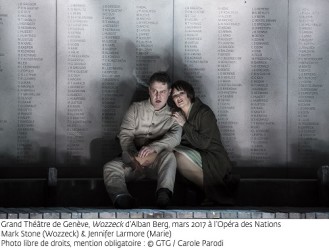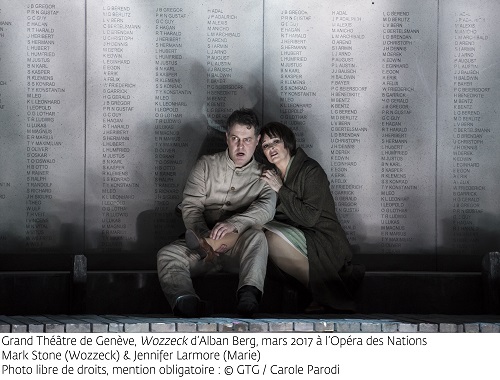 Switzerland Berg, Wozzeck: Soloists, Chorus of the Grand Théâtre Geneva, Orchestre de la Suisse Romande / Stefan Blunier (conductor), Théatre des Nations, Geneva, 4.2.2017. (AL)
Switzerland Berg, Wozzeck: Soloists, Chorus of the Grand Théâtre Geneva, Orchestre de la Suisse Romande / Stefan Blunier (conductor), Théatre des Nations, Geneva, 4.2.2017. (AL)

Cast:
Wozzeck – Marc Stone
Marie – Jennifer Larmore
Drum-Major – Charles Workman
Doctor – Tom Fox
Andres – Tansel Akzeybek
The Captain – Stephan Rügamer
Margret – Dana Beth Miller
The apprentices – Alexander Milev and Erlend Tvinnereim
Madman – Fabrice Farina
Marie’s son – Gaétan Haro
A Soldier – Omar Garrido
Production:
Director – Daniel Eliss based on a production by David McVicar
Design and Costumes – Vicky Mortimer
Lighting Design – Paule Constable and Christopher Maravich
Any performance of Wozzeck needs to be seen. Berg’s Opera remains a masterpiece of depth, density and drama. Every hearing enhances the understanding of the work. Music lovers in Swiss Romande should be encouraged to attend the remaining performances.
But they should be warned that the temporary Théatre des Nations used while the Grand Théatre is being renovated is not suited for such a large scale work. Regardless of the efforts of the musicians, the work’s intense orchestration come across as overly loud. The orchestra pit cannot accommodate the string section the work requires. As a consequence, balances were difficult to achieve and the brass came out very strongly. One longed for another conductor than Stefan Blunier and wished that Jonathan Nott, the new music director of the Swiss Romande Orchestra and former music director of Boulez’s ensemble contemporain had been there.
First time audiences to this work may feel that this fits with Büchner’s violent story but this is not the case. Wozzeck should be ideally ½ Mahler and ½ Zimmerman. Berg’s range of dynamics is indeed wide but he knows how to indicate in his score where the main voice, the “Haupstimme”, should be and he writes for all sections of the orchestra, not solely for the brass. Such mastery was not present here. Voices were often covered by the orchestra, the mystery of the work and its overall continuity were lost.
The voices were of mixed quality. Some of the singers may be past their prime. Tom Fox’s Doctor has lost color and some depth. He was more “speaking than singing” but managed still to project his character. His delivery of the “Still, ganz still” when hearing of Wozzeck’s drowning was appropriately chilly. This could also be the case for Jennifer Larmore’s mezzo who was more comfortable with the lower register but lacked power and presence at the top. But should she have been asked to sing this part in the first place? Charles Workman looked the part of the Drum-Major but was not comfortable with the tessitura nor helped by the orchestra.
On the other hand, Stephan Rügamer’s Captain was excellent. The voice is focused and he made most of the words understanble, projecting strongly. In the very small part of the apprentice Alexander Milev showed us the value of having young singers in Berg’s music: we had volume, color and he really sang. Marc Stone was making his début in Geneva as Wozzeck. He had all the vocal material for the part, his technique is strong and he gave an intense portrayal. This is a name to look our for, and he received well-deserved applause from the audience.
There were many things to admire in the production. The staging by David McVicar is imported from Chicago. It is always tricky to adapt a third party staging but the ideas came across with clarity. The setting was updated to take place in between both world wars and at the center of the stage stood a monument for the fallen soldiers. The violence present in all the work was clearly visible and felt.
Action was easy to follow and always thought through. Several moments were particularly well defined. The duo between the Doctor and the Captain is a great scene which mixes black comedy and drama which benefited from strong acting. The first cabaret scene was particularly successful. There are many things happening in the action and the producer staged by carefully following the cues from the music. The madman reminded us of Joel Grey’s master of ceremonies in Bob Fosse’s Cabaret. Xavier Dami, one of the Grand Théatre’s gifted piano coaches was coordinating the on-stage ensemble. It is not clear whether this was intentional, but he was reminiscent of the famous set of silhouettes of Gustav Mahler. Berg would have approved. The powerful last scene showing Wozzeck’s child taking his place was striking.
Only in a few instances was the conducting too bright. Like the orchestra, a little more subtlety would have been welcome.
But in the end, Wozzeck is a masterpiece that rarely leaves viewers intact or unmoved. We do not hear it often and in spite of the musical issues, it is not be missed by whoever wishes to experience strong theatrical opera.
Antoine Lévy-Leboyer
